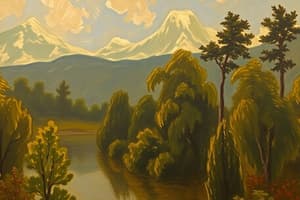Podcast
Questions and Answers
Which organization is primarily responsible for addressing global health concerns?
Which organization is primarily responsible for addressing global health concerns?
- World Health Organization (correct)
- International Monetary Fund
- United Nations
- NATO
What is the longest river in South America?
What is the longest river in South America?
- Mississippi
- Yangtze
- Nile
- Amazon (correct)
During which historical period did the Industrial Revolution occur?
During which historical period did the Industrial Revolution occur?
- Renaissance
- Middle Ages
- Modern Era (correct)
- Ancient Civilizations
Which literary movement is characterized by a focus on individual experience and emotion?
Which literary movement is characterized by a focus on individual experience and emotion?
What is the primary purpose of the scientific method?
What is the primary purpose of the scientific method?
Flashcards
Current Global Issues
Current Global Issues
Major global challenges include climate change, geopolitical tensions, and pandemic recovery.
Name the seven continents
Name the seven continents
Africa, Antarctica, Asia, Europe, North America, Australia, and South America.
Key Historical Periods
Key Historical Periods
Ancient Civilizations, Middle Ages, Renaissance, Industrial Revolution, and World Wars.
Steps of the Scientific Method
Steps of the Scientific Method
Signup and view all the flashcards
Key Literary Terms
Key Literary Terms
Signup and view all the flashcards
Study Notes
Current Events
- Significant global issues: Climate change, geopolitical tensions, pandemic recovery.
- Major events: Elections, international summits, natural disasters.
- Key organizations: United Nations, World Health Organization, NATO.
- Notable leaders and their policies: U.S. President, EU leaders, heads of state from major countries.
Geography
- Continents: Seven continents - Africa, Antarctica, Asia, Europe, North America, Australia, South America.
- Major rivers and mountains: Nile, Amazon, Himalayas, Rockies.
- Capitals: Familiarize with world capitals (e.g., Washington D.C., Paris, Tokyo).
- Map skills: Understanding latitude/longitude, reading topographic maps, identifying countries and regions.
History
- Significant periods: Ancient civilizations, Middle Ages, Renaissance, Industrial Revolution, World Wars.
- Key figures: Influential leaders (e.g., Julius Caesar, Genghis Khan, Nelson Mandela).
- Important events: Signing of the Declaration of Independence, fall of the Berlin Wall, Civil Rights Movement.
- Historical impacts: Colonization, revolutions, technological advancements.
Literature
- Classic authors: Shakespeare, Mark Twain, Jane Austen, Gabriel García Márquez.
- Literary movements: Romanticism, Modernism, Postmodernism, Realism.
- Notable works: "Pride and Prejudice," "Moby Dick," "One Hundred Years of Solitude."
- Key literary terms: Protagonist, antagonist, theme, metaphor, allegory.
Science
- Basic disciplines: Biology, Chemistry, Physics, Earth Science.
- Scientific method: Steps include observation, hypothesis, experimentation, conclusion.
- Key concepts: Evolution, laws of motion, periodic table, ecosystems.
- Major discoveries: Penicillin (Fleming), Theory of Relativity (Einstein), DNA structure (Watson and Crick).
Current Events
- Major global issues include climate change, geopolitical tensions, and pandemic recovery, significantly impacting international relations and domestic policies.
- Noteworthy events encompass elections, international summits, and natural disasters, shaping political landscapes and humanitarian responses.
- Key organizations involved in global governance include the United Nations (UN), World Health Organization (WHO), and NATO, each addressing various international challenges.
- Influential leaders, such as the U.S. President and heads of state from major countries, implement policies that affect both domestic and global affairs.
Geography
- The world consists of seven continents: Africa, Antarctica, Asia, Europe, North America, Australia, and South America, each with distinct cultures and ecosystems.
- Major geographical features include the Nile and Amazon rivers, and the Himalayan and Rocky Mountains, crucial for biodiversity and human settlement.
- Familiarity with world capitals, like Washington D.C., Paris, and Tokyo, is vital for understanding global politics and cultural exchanges.
- Essential map skills include comprehension of latitude and longitude, proficiency in reading topographic maps, and the ability to identify various countries and regions.
History
- Key historical periods include Ancient Civilizations, the Middle Ages, the Renaissance, the Industrial Revolution, and the World Wars, each shaping modern society.
- Influential figures, such as Julius Caesar, Genghis Khan, and Nelson Mandela, played pivotal roles in history through leadership and significant reforms.
- Important events include the Signing of the Declaration of Independence, the fall of the Berlin Wall, and the Civil Rights Movement, which have defined rights and freedoms.
- Historical impacts include the aftermath of colonization, various revolutions, and notable technological advancements that transformed lifestyles and economies.
Literature
- Classic authors like Shakespeare, Mark Twain, Jane Austen, and Gabriel García Márquez have greatly influenced literature and cultural discourse.
- Significant literary movements include Romanticism, Modernism, Postmodernism, and Realism, each representing different philosophies and styles.
- Notable works include "Pride and Prejudice," "Moby Dick," and "One Hundred Years of Solitude," recognized for their themes and storytelling techniques.
- Key literary terms encompass protagonist, antagonist, theme, metaphor, and allegory, fundamental for analyzing and understanding literary texts.
Science
- Fundamental scientific disciplines consist of Biology, Chemistry, Physics, and Earth Science, each contributing to our understanding of the natural world.
- The scientific method encompasses observation, hypothesis formulation, experimentation, and conclusion, serving as a systematic approach to research and discovery.
- Key concepts in science include evolution, laws of motion, the periodic table of elements, and ecosystem dynamics, essential for comprehending life and physical sciences.
- Major scientific discoveries include Penicillin (by Alexander Fleming), the Theory of Relativity (by Albert Einstein), and the DNA structure (discovered by James Watson and Francis Crick), which have revolutionary implications in their respective fields.
Studying That Suits You
Use AI to generate personalized quizzes and flashcards to suit your learning preferences.




